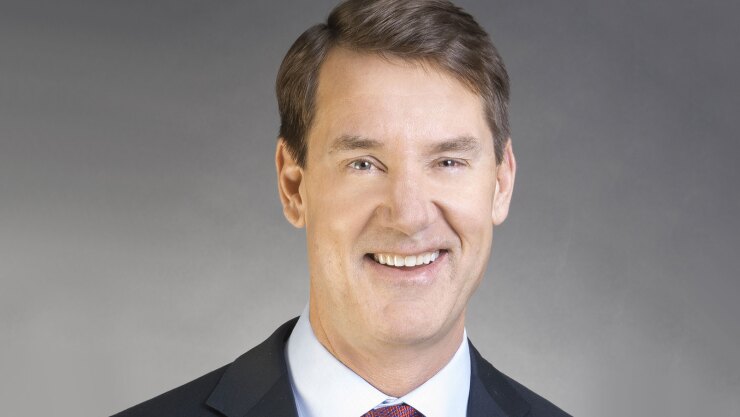The chief executive of PNC Financial Services Group in Pittsburgh says recession fears — and potential hits to bank earnings — are overblown.
“I am personally confused about all the concern that sits out there on banking reserves and the coming recession and the impacts on profitability of banks,” PNC Chairman, President and CEO William Demchak said on the company’s second-quarter earnings call Friday.
The $541 billion-asset PNC is braced for a downturn that “will hurt a little bit,” but Demchak said he does not expect a severe recession or anything like the sudden drop-off in economic activity the United States endured early in 2020 amid the initial coronavirus outbreaks.
“I don't think there's any cliff involved,” Demchak said. What’s more, he added, “the trouble ahead lies somewhere in the middle of next year, not any time in the next six months.”
Bank stocks have come under pressure this year as the central bank aggressively raised interest rates to combat inflation, which reached a four-decade high in June.
The Federal Reserve has boosted rates three times so far this year, including a hike of 75 basis points in June. That marked the

The KBW Nasdaq Bank Index is down about 25% on the year.
“Obviously, there is a lot of recession trepidation in the market,” said Robert Bolton, president of the bank investor Iron Bay Capital.
“Some bankers share in that worry,” Bolton added. “But a lot of the bankers I’ve met with are still pretty confident, and that’s based on what they’re seeing with credit quality and hearing from their commercial clients in terms of positive sentiment. Businesses are growing, hiring.”
At Citigroup, which increased its loan-loss reserves by $424 million during the second quarter, CEO Jane Fraser did not make quite as blunt of an assessment as Demchak about recession fears, but she did tell analysts Friday that she doesn't think a downturn, if it happens, will be as sharp as previous ones.
"Little of the data I see tells me the U.S. is on the cusp of a recession," Fraser said. "Consumer spending remains well above pre-COVID levels with household savings providing a cushion for future stress and, as any employer will tell you, the job market remains very tight."
During the second quarter, JPMorgan increased its loan-loss reserves by $428 million, in part because of increased economic uncertainty.
Wells Fargo, meanwhile, bumped up its provisions for losses by $580 million to account for growth in its loan book. Chief Financial Officer Mike Santomassimo said the $1.9 trillion-asset bank feels its reserves are “appropriate” in light of the current economic outlook and its caution about releasing the reserves it built up earlier in the pandemic.
PNC provided $36 million for possible credit losses during the second quarter — largely to keep up with loan growth.
Asked by an analyst why PNC didn’t set aside more, Chief Financial Officer Robert Reilly noted that the bank — like its peers — uses models to determine likely losses, and its assessment of looming challenges did not call for a large build-up in reserves.
“We’re appropriately reserved,” Reilly said on the earnings call.
PNC reported second-quarter net income of $1.5 billion, or $3.39 per share, up from $1.1 billion, or $2.43 per share, a year earlier.
Adjusted for costs tied to
Second-quarter revenue increased 10% to $5.12 billion, bolstered in large part by a jump in interest income.
PNC’s second-quarter net interest income of $3.1 billion surged 18% from a year earlier, boosted by higher yields on loans following the Fed rate hikes. Average loans grew 12% to near $305 billion, driven by commercial loan growth.
Allissa Kline and Polo Rocha contributed to this report.






